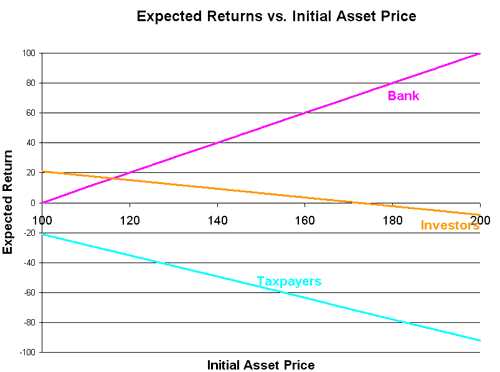Hosed At Any Price -- An Update on Geithner Plan Analysis
I had someone ask me whether the results in this post on the economics of Geithner's latest brainstorm were an artifact of the selected purchase price for the distressed asset of 150. The answer is no. Investors are willing to buy this asset on these terms at any price under 175, and banks are willing to sell for any price over 100. Here is the graph of expected values as a function of the purchase price

Note the taxpayer gets hosed at any price (kind of the Obama-Geithner update on "unsafe at any speed") Two things I had not realized before:
- Without competition among investors to drive up the price, a very large percentage of the taxpayer subsidy goes to the investors rather than the banks.
- There is an interesting incentive to collude here between banks and investors. The best outcome for both is for investors to pay a high price to banks and then have the bank kick back some portion to the investor.
Ha!, "There is an interesting incentive to collude here between banks and investors. The best outcome for both is for investors to pay a high price to banks and then have the bank kick back some portion to the investor."
Exactly right, but maybe you're thinking a bit too obviously. The collusion can be implicit -- the investors will have large established exposure to the banks (whether through bonds or straight equity or what have you). Not only that, but thie firm returns will be much more dependent on the bank rather than the Geithner investment.
Take the firm into account, and the Investor line on your graph will be sloping upward as well. The only thing that could keep the price down would be inter-investor competition. Unfortunately, it may be so stacked in favor of 'favored invetors' that you won't see that competition. See Bridgwater's letter explaining why they want no part of the game.
Actually the best outcome would be for the banks to BE the investors.
I think it would be more dramatic to show it as percent ROI. The investor gets a huge amount at $100, but it looks small in a graph in absolute dollars.
Marginal Revolution sounds the alarm about the danger of uncontrolled manipulation of the system that Geithner formulated. Like Warren, the conclusion is that the taxpayer gets hosed. The bankers can have it their way.
No the "Financial Times":http://www.ft.com/cms/s/0/358e479a-1fbf-11de-a1df-00144feabdc0.html?nclick_check=1 is echoing Marginal Revolution on the possibility of gaming the sales.
I still say it's all about the bonds.
Sean, what's to stop banks from colluding with each other rather than outside investors? They can bid on each others toxic assets and essentially trade them among themselves (by high bidding). In essence, they're trading them back and forth with the taxpayer now holding all the downside risk. Because they only need to put up to 7% of the total bid, they can value them fully and exchange a taxpayer guarantee for 93% of their value.
I think there is a demand issue-the residential real estate market seems to be finding a floor where smart money is not afraid to look less than smart by jumping in the game-heck the value may decrease 5 to 10%-but not another 20%. But, even though the decline in value appears to be slowing, there is doubt about velocity-and just how 'fast' huge amounts of residential real estate inventory will be able to move in 2009 and 2010. The RTC was an interesting decision; folding FSLIC into FDIC was an interesting decision. It will be interesting to see if OTS gets folded into OCC or FDIC and what type of velocity or traction is obtained for the sale of toxic assets. The FDIC's Debt X Market seems to be increasing in velocity-but, maybe folks are now going to wait and see just how motivated a seller the FDIC will be in the next 6 to 18 months. Maybe 10 year clients of JP Morgan/Nations who lost their shirt on that stock should be able to profit from Goldmans/Northern Trusts involvement in this market? Isn't economics the area where you can be wrong your whole life and still be considered an expert? My problem is that at the end of a long day I would prefer playing a couple of games of freecell vs really thinking long enough to write something that I can understand, let alone someone else. For me, the G Man/Treasury Man has not recovered from calling out China in his first month in office.